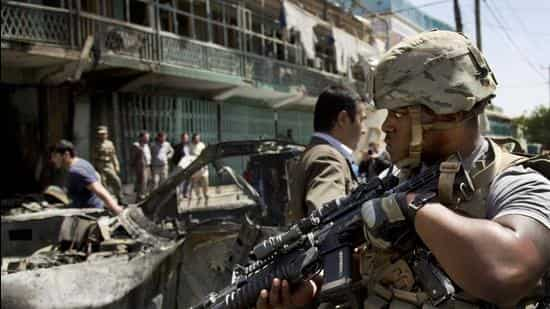
The exit plan that President Biden unveiled on Wednesday to “end America’s longest war” and bring all US-led coalition forces back home completely and unconditionally by September 11 includes a larger role for India along with other regional players in shaping the war-ravaged country’s future.
“We’ll ask other countries – other countries in the region – to do more to support Afghanistan, especially Pakistan, as well as Russia, China, India, and Turkey,” Biden said. “They all have a significant stake in the stable future for Afghanistan.”
In March, Secretary of State Antony Blinken had in a letter to Afghan President Ashraf Ghani proposed a UN-convened conference of foreign ministers of India, Russia, Pakistan, China, and the United States to find a “unified approach” to support the Afghan peace process.
Turkey is hosting, as also proposed by Blinken, that meeting starting April 24.
People familiar with India-US ties, especially in the area of Afghanistan, said Biden has indeed been pulling India closer on Afghanistan but wanted to watch the process longer to see it was indeed a sustained move. Thus far, at least, he appears to have been more enthusiastic about Indian involvement than his predecessors.
President George W Bush, who launched the war in Afghanistan, was content to let India focus on non-security reconstruction efforts, which have continued since, worth an estimated $3 billion so far – on roads, power plants, schools, hospitals and rebooting the banking system.
President Barack Obama had been in a hurry to leave but got persuaded by his general to order a massive surge at the start of his term and then spent the rest of his time cutting it down.
President Donald Trump had asked India to step up and do more in the area of economic assistance and development as part of his South Asia strategy. But India was not at the table for the 2019-20 Afghan peace talks, though the US special envoy Zalmay Khalilzad travelled to New Delhi often to keep them abreast with the talks.
“The Biden administration is clearly looking for a greater role for India in Afghanistan’s future than previous administrations,” said Husain Haqqani, former Pakistani ambassador to the US, who is now director for South and Central Asia at the Hudson Institute.
“Question is, how will they (the Biden administration) persuade Pakistan and India to accept each other’s or even America’s vision?” he added.
India has wanted to play a larger role in Afghanistan, going beyond its financial and training assistance. But it has struggled to find a place at the table in the constantly changing constellation of countries jostling for primacy and relevance. The Trump administration had kept India out of the peace talks and so did Russia, by not inviting it to peace talks it hosted in March – only China, Pakistan, Iran and the United States were invited.
Pakistan is mostly blamed for India’s exclusion from the process, as it leverages its shared border and history with Afghanistan to get its way. Growing Indian influence there through a long list of assistance and cooperation has made Islamabad more insecure and nervous.




